- Home
- David Downing
Zoo Stationee Page 14
Zoo Stationee Read online
Page 14
After slipping on some icy cobbles and being almost run over by a tram he decided a rest was in order and retreated to his hotel for a nap. It was 7:00 by the time he woke, and he felt hungry again. A new receptionist recommended a restaurant on Starowi?lna Street, which turned out to be only a few doors from the cinema showing the Marx Brothers movie. It was too good an invitation to miss. After partaking of a wonderful wienerschnitzelat least Cracow had something to thank the Hapsburg Empire forhe joined the shivering queue for the evening showing.
Inside the cinema it was hot, noisy, and packed. Surveying the audience before the lights went down, Russell guessed that at least half of the people there were Jewish. He felt cheered by the fact that this could still seem normal, even in a country as prone to anti-Semitism as Poland. He wished Ruth and Marthe were there with him. And Albert. He couldnt remember ever seeing Albert laugh.
The newsreel was in Polish, but Russell got the gist. The first item featured a visit to Warsaw by the Hungarian Foreign Minister, and no doubt claimed that he and Colonel Beck had discussed matters of mutual importance, without spelling out what everyone knew these werechoosing their cuts of Czechoslovakia once the Germans had delivered the body. The second item concerned Danzig, with much piling of sandbags round the Polish Post Office. The third, more entertainingly, featured a man in New York walking a tightrope between skyscrapers.
The movie proved a surreal experience in more ways than one. Since it was subtitled in Polish, the audience felt little need to keep quiet, and Russell had some trouble catching all the wisecracks. And as the subtitling ran a few seconds behind the visuals, he often found himself laughing ahead of everyone else, like some eccentric cackler.
None of it mattered, though. Hed loved the Marx Brothers since seeing Animal Crackers during the last days of the Weimar Republic, before Jewish humor followed Jewish music and Jewish physics into exile. By the time Broth of the Bird was half an hour old he was literally aching with laughter. The films subject-matterthe approach of an utterly ridiculous war between two Ruritanian countrieswas fraught with contemporary relevance, but any dark undertone was utterly overwhelmed by the swirling tide of joyous anarchy. If you wanted something real to worry about, there were cracker crumbs in the bed with a woman expected. The only sane response to rampant patriotism was: Take a card! As the audience streamed out of the cinema, at least half the faces seemed streaked with tears of laughter.
It had stopped snowing. In fact, the sky seemed to be clearing. As he walked back toward the city center, Russell had glimpses of the Wawel Castle and the cathedral silhouetted against a starry slice of sky. Following the tram-lines through a gap in the old medieval walls he eventually reached the Rynek Glówny, where the cafés and restaurants were humming with conversation and all sorts of music. Standing in mid-square beside the Cloth Hall he could hear pianos playing Mendelssohn, Chopin, and American blues.
People were having fun. They did that in Berlin too, but there was something different in the air. In Berlin there was always an edge of caution: looks over the shoulder, a rein on the tongue. Maybe there was one here tooheaven knew, the regime in Warsaw was illiberal enoughbut he couldnt feel it. If the Poles were facing the most threatening year of their recent existence, they werent letting on.
He thought about having a nightcap, but decided on not making things anymore difficult for Shchepkin than he needed to. He was only spending one night at the hotel.
There was no sign of him in the lobby, or of anyone else, suspicious or not. There was no message at reception when he collected his key. After ascending in the delightful glass-and-wrought-iron cage, he found his corridor silent, his door locked. The room was empty. Laughing at himself, he checked the wardrobe. No Shchepkin. No Harpo Marx.
It was almost midnight. He stretched out on the sofa with the book of John Kling detective stories which Paul had loaned him weeks before, one ear cocked for footsteps in the corridor, but all he heard was an occasional drunken shout from the street below. At 12:45 he gave up and went to bed, laughing in the dark about cracker crumbs.
HE WAS WOKEN BY CHURCH BELLS. It was just after eight, a thin line of gray light separating the curtains on the near window. Russell clambered out of bed and pulled them back. The tip of the church spire opposite was lit by an invisible sun, the sky clear. It looked bitterly cold.
He had mixed feelings about Shchepkins non-appearance. He couldnt help feeling annoyed that he might have come all this way, missing a weekend with Effi and Paul, only to be stood up. On the other hand, he could hardly say the weekend had been wasted: He liked Cracow, had loved Duck Soup, and had the makings of a Germanys Neighbours article. If the Soviets were already tired of him he supposed he should feel relieved, but he couldnt help feeling an unexpectedly poignant sense of anti-climax.
If nothing else, he told himself, the projected Soviet series had inspired him to generate others. And Shchepkinhe looked at his watchstill had seven hours to make contact before his train left.
He was damned if he was going to stay cooped up in his room, even assuming the hotel would let him. He decided to pack and take his bag to the left luggage at the main station, which was only five minutes walk away. He could get a taxi from there to the Plaszów station when the time came.
An hour later, he was enjoying coffee and rolls in an almost empty station buffet. There were no English or German papers for sale, andit being Sunday morningthere was little activity to observe. One small shunting engine chugged its way through in apparent search of work, but that was it. Russell was about to leave when a dark-haired young man loomed over his table. Have you a pencil I could use? he asked in German.
Russell handed his over.
The man sat down, wrote out what appeared to be train times on the corner of his newspaper, and handed the pencil back. Zygmunts Chapel, he said pleasantly as he got to his feet. Two oclock.
RUSSELL REACHED THE FOOT of the ramp leading up to the Wawel with time to spare. On the slopes of the hill several bunches of children were throwing snowballs at each other and squealing with delight, while their parents stood and chatted, plumes of breath coalescing in the air between them. Away to the left, the yellow walls and red tile roof of the Royal Palace stood stark against the clear blue sky.
The ramp ended in a gate through the old fortifications, close by the southern end of the cathedral. Thisin contrast to the church on the Rynek Glównywas an elegant mess featuring spires and domes in a bewildering variety of styles and sizes, as if the whole thing had been arranged by a playful child.
The Zygmunt Chapel was off the nave to the right. The tombs of two menkings, Russell assumedwere vertically stacked amid a feast of renaissance carving. The accompanying writing was in Polish, but he recognized the name Jagiello from the Danzig stamp wars.
Beautiful, yes? said a familiar voice at his shoulder.
It is, Russell agreed. Shchepkin was wearing the same crumpled suit, and quite possibly the same shirt, but on this occasion a dark green tie was hanging, somewhat loosely, beneath the collar. A fur hat covered his hair.
Have you visited Cracow before? the Russian asked.
No, never.
Its one of my favorite cities.
Oh.
Have you seen the Holy Cross Chapel? Shchepkin asked.
No. . . .
You must. Come. He led the way back toward the entrance, and the chapel to its left. Russell followed, somewhat amused at being shown the wonders of Christendom by a communist agent.
The chapel was extraordinary. There was another Jagiellonian tomb, carved in marble in the year Columbus stumbled across America, and a series of slightly older Byzantine frescoes. As they emerged, Shchepkin stood looking down the nave, then turned his eyes upward toward the soaring roof.
My father was a priest, he said in reaction to Russells look. One thing more, he added, gesturing toward the sh
rine in the center of the nave. It held a silver coffin of staggering workmanship. It was made in Danzig, Shchepkin pointed out, as if their relationship needed geographical continuity. Enough, he added, seeing Russells expression. Well save the crypts for another time. Lets go outside.
Between the cathedral and the walls overlooking the Vistula there was a large open space. Russell and Shchepkin joined the scattering of couples and small groups who were following the freshly cleared circular path, almost blinded for a while by the brightness of sun on snow.
The article was perfect, Shchepkin said eventually. Just what was required. He produced an envelope from his pocket and slipped it into Russells. For your research work, he said.
Russell stole a quick look at it. It was a bankers draft in reichsmarks. Lots of them.
Whats the next article about? Shchepkin asked.
Transport.
Excellent. So what are you telling me today?
Russell went through the results of his visit to Dresden, his impressions and analysis. It all seemed pretty obvious to him, but Shchepkin seemed satisfied enough, nodding and interjecting the occasional question or comment. Russell had the feeling he could have listed the stations on the Ringbahn.
After one circuit they started another. They were not alone in this, but one man in particular, limping along fifty yards behind them, struck Russell as suspicious. But when he glanced over his shoulder for the third time Shchepkin told him not to worry. One of mine, he said almost affectionately. Local help, he added, rubbing his hands together. What did the SD have to say?
Russell recounted his meeting with Kleist, and the demand for previews of each article. He also told Shchepkin about the letter Kleist had written for him, and regretted doing so almost instantly: He wanted the Russian worried for his safety, not encouraged to risk it. And the British want previews, too, he added quickly, hoping to divert his listener with an unwelcome shock.
Shchepkin, though, just laughed. And how are you explaining these trips? he asked.
Russell explained about Germanys Neighbours and Ordinary Germans.
Not bad, Shchepkin said. We will make an intelligence officer of you yet.
No thanks.
Shchepkin gave him one of those looks, amused but disappointed. Are you planning to take sides in the coming war? he asked.
Not if I can help it, was Russells instinctive response. If truth be told, he had no idea.
Have you heard of the poet Yeats? Shchepkin asked out of the blue.
Of course.
Shchepkin grunted. One never knows with the English. So many of you look down on anything Irish.
Yeats is a wonderful poet.
He died yesterday, Shchepkin said.
I didnt know.
You know that poem, The Stolen Child? I always loved that line, a world more full of weeping than you can understand.
Russell said nothing.
Shchepkin shook his head, as if to clear it. Well meet in Posen next month. Or Pozna? as the Poles call it now. And wed like you to talk to armament workers, he said. In Berlin, the Ruhryou know where the big factories are. We need to know if there are problems there, if the workers are ready for political action.
Thatll be difficult, Russell said.
Ordinary German workers, caught between their natural desire for peace and patriotic concern for the Fatherland, Shchepkin suggested. Im sure you can manage it.
Ill try, Russell agreed.
You must, Shchepkin said. And you really should wear a hat.
Idiots to Spare
BERLIN WAS GRAY AND OVERCAST. As his train drew into Friedrichstrasse Station, Russell thought about taking the Stadtbahn another couple of stops and surprising Effi in bed, but decided against it. She was rarely at her best this early in the morning.
Having breakfasted on the train, he skipped coffee in the buffet and headed straight for his bank on Behrenstrasse, where he deposited Shchepkins bankers draft. As he headed for Französischestrasse in search of a tram home Russell felt an almost dizzying sense of solvency. Presents for everybody, he thought. Including himself.
The sense of well-being evaporated the moment he saw Frau Heideggers face. Oh Herr Russell, she said, grabbing his left arm with both hands. Thank God youre back. I. . . .
Whats happened?
Herr McKinleyhes dead. He committed suicidecan you believe it? The poor boy. . . . And he seemed so happy these last few weeks. I cant. . . .
How? Russell asked. He felt cold all over, and slightly nauseous. How did he kill himself? He couldnt believe it. He didnt believe it.
Frau Heidegger mopped up a tear. He threw himself in front of a train. At Zoo Station. There were lots of witnesses.
When?
Late on Saturday. The police came just before midnight and locked his room. Then they came back yesterday. They were up there for hours.
The Kripo?
She looked bewildered for a second. Yes, yes, I think so. There were so many of them. They must have been looking for a suicide note, I think. Or something to tell them why he did it.
Or a letter, Russell thought.
But I dont think they found anything, Frau Heidegger went on. They seemed very frustrated when they went. I suppose theyre worried that the Americans wont believe he killed himself.
Perhaps, Russell said. He still felt stunned.
They left the room very tidy, Frau Heidegger said inconsequentially. And they want to talk to you, she added. As soon as he gets back they said. And they put a note under your door saying the same thing. I have the telephone number. She disappeared back into her apartment for a few seconds and re-emerged with what looked like a torn-off page from a police notebook. There was a number and a nameKriminalinspektor Oehm.
Ill ring him now, Russell said.
Yes, please, Frau Heidegger said, as if it would take a huge weight off her mind.
The underling who answered knew who Russell was. The Kriminalinspektor would like to see you immediately, he said, with the stress on the last word. At the Alex. Room 456.
Im on my way, Russell said. It seemed the politic thing to do.
Ill look after your bag, Frau Heidegger said, picking it up and moving toward her door. You can collect it when you get back.
He started walking toward the U-bahn, thinking it would be quicker, but changed his mind once he reached Lindenstrasse. Why was he hurrying? And a tram ride would give him time to think.
He climbed aboard the first Alexanderplatz-bound tram and stared blankly out of the window. If there was one thing he knew, it was that McKinley hadnt killed himself. In fact, he could hardly think of anyone less likely to do so. He supposed it could have been an accidentthe platforms got pretty crowded at Zoo Station after theatre-closing timebut if so, why the rush to a suicide verdict? Frau Heidegger had mentioned witnesseslots of them. An apparent suicide, Russell realized, offered stronger grounds for a police investigation than a simple accident. Theyd spent most of yesterday in McKinleys room, and they must have been looking for something. Theresa Jürissens letter was an obvious candidate, but who knew what other pieces of paper McKinley had collected in support of his story. And it looked as though they hadnt found what they were looking for. Russell wasnt sure how reliable a judge of Kripo moods Frau Heidegger was, but the urgency of his summons certainly suggested they were missing something.
If they hadnt found the letter then where the hell was it? Six days had passed since he and McKinley had visited Theresa Jürissen and McKinley had been in a hurry; it didnt seem likely that hed taken his time sending her the money. Unless, of course, hed had trouble raising it. And she might have had trouble getting down to the poste restante to pick up the
money. The letter could still be in the post. Or in her possession. Hed have to warn her, for his own sake as well as hers. If she was arrested, his own involvement would come out, and even if the Kripo accepted that hed only been along as an interpreter, hed still failed to report a possible crime against the state. At the very least, grounds for deportation. At worst. . . . It didnt bear thinking about.
If McKinley had received the letter and they hadnt found it, then what had he done with it? He might have risked posting it off to the States, but Russell didnt think so. If theyd been watching himand it seemed likely that they hadthen any outgoing mail would have been intercepted. Russell remembered McKinleys reluctant admission that he thought he was being followed, and his own scarcely concealed derision. Sorry, Tyler, he murmured out loud, drawing a stare from a woman opposite him.

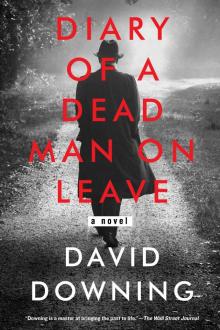 Diary of a Dead Man on Leave
Diary of a Dead Man on Leave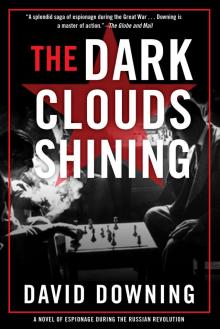 The Dark Clouds Shining
The Dark Clouds Shining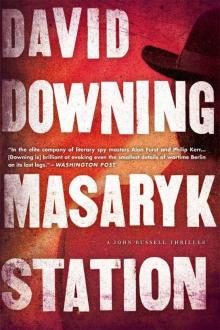 Masaryk Station (John Russell)
Masaryk Station (John Russell)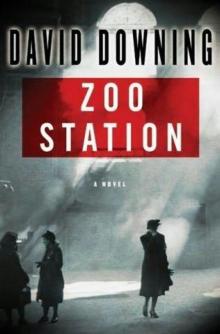 Zoo Stationee
Zoo Stationee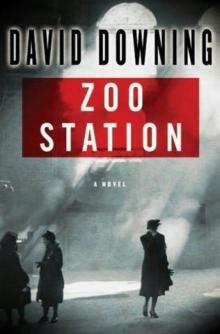 Zoo Station jr-1
Zoo Station jr-1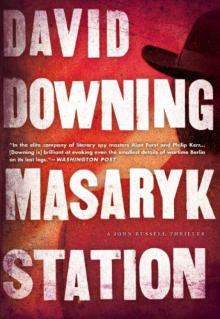 Masaryk Station
Masaryk Station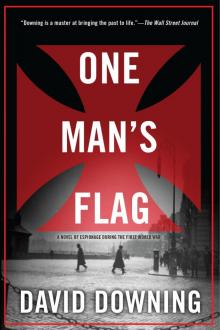 One Man's Flag
One Man's Flag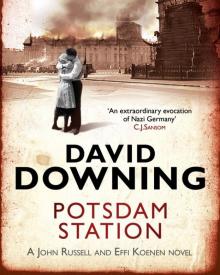 Potsdam Station jr-4
Potsdam Station jr-4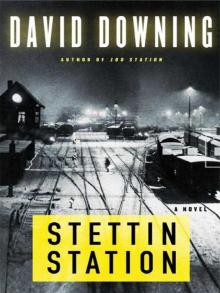 Stattin Station jr-3
Stattin Station jr-3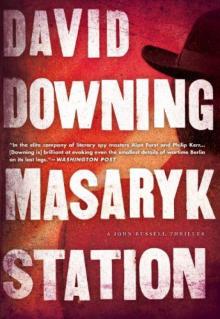 Masaryk Station jr-6
Masaryk Station jr-6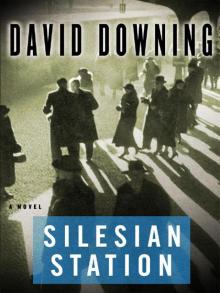 Silesian Station (2008) jr-2
Silesian Station (2008) jr-2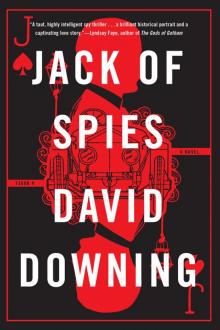 Jack of Spies
Jack of Spies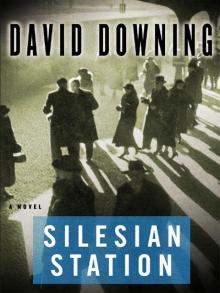 Silesian Station (2008)
Silesian Station (2008) The Moscow Option
The Moscow Option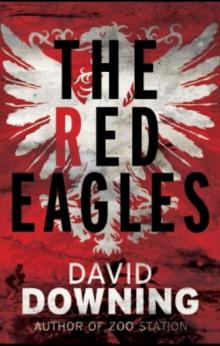 The Red Eagles
The Red Eagles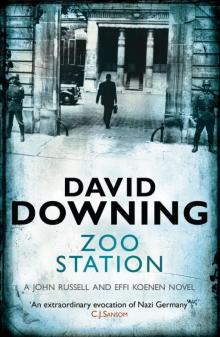 Zoo Station
Zoo Station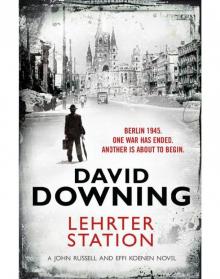 Lehrter Station
Lehrter Station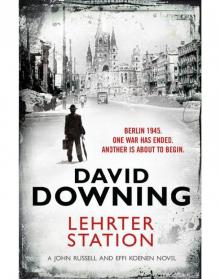 Lehrter Station jr-5
Lehrter Station jr-5